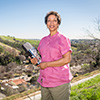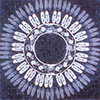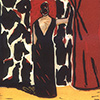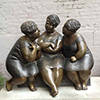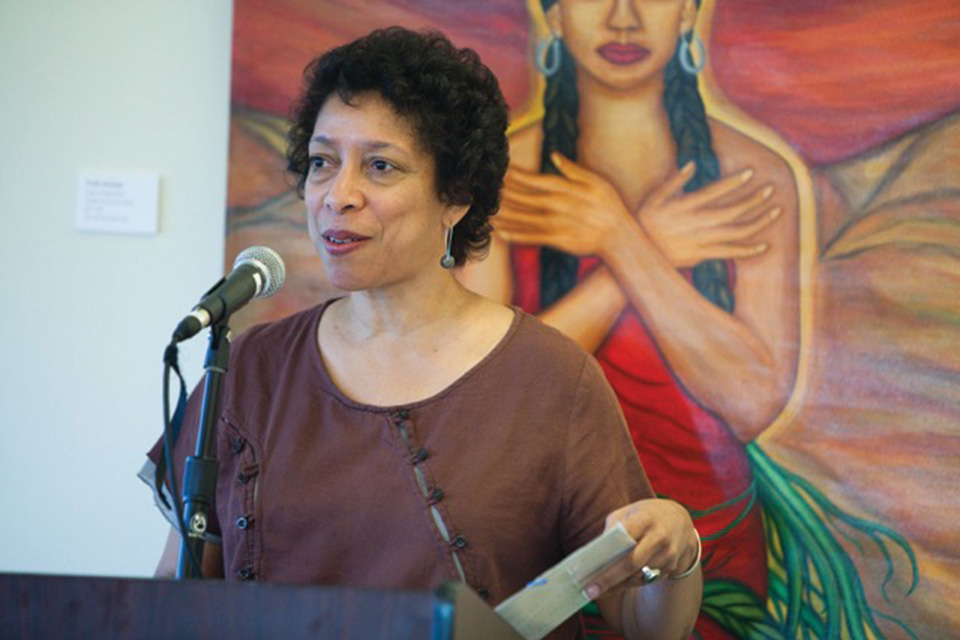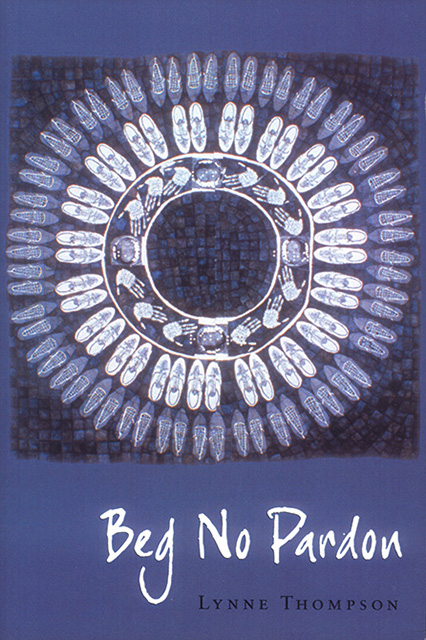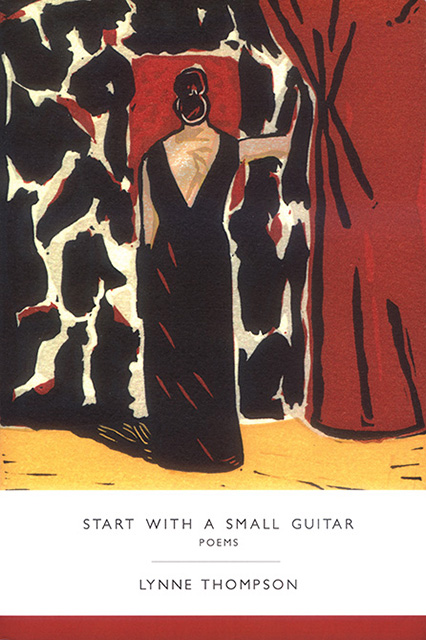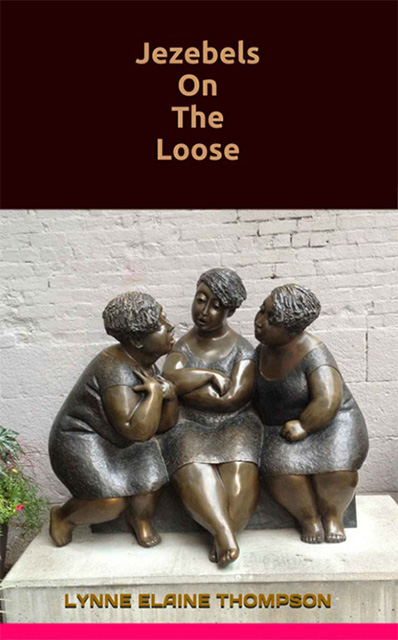Lynne Thompson
LYNNE THOMPSON: At the Intersection of Mystery & Mystery
If Lynne Thompson were applying for a job as a poet, she might cite her previous experience as a "passionate secret . . . conjurer of mummery / and feral thought . . . sizzling arrow."(1) Thompson asks us—no, compels us—to look closely at our most entrenched suppositions, those blind certainties, facts exposed as fiction. She uses language as a laser to spotlight the fissures in our understanding and pull them apart so that we see deeper than ever before and can open ourselves to the universal. And, oh, what language she employs. In poem after poem, she takes us by the hand with confident music until we're riffing toward heartbreak and revelation.
Inspired by the poets Natasha Trethewey and Marilyn Nelson, Thompson is obsessed with the intersection of public and personal history, with what gets saved and what doesn't. Her chosen themes bridge families and cultures, uniting them with a sense of mystery and a searing honesty.
Thompson’s first full-length collection, Beg No Pardon, won double acclaim with the Perugia Press Book Prize and Great Lakes Colleges Association New Writers Award. Her second collection, Start with a Small Guitar, is joined by three chapbooks. You can find her poems in leading journals and anthologies. A multiple Pushcart Prize nominee and fine essayist, she is reviews and essays editor for the literary journal Spillway.
Thompson represents a rare species: a Los Angeles native. Growing up here has informed her work in ways evident and subterranean. L.A.'s extraordinary diversity—its different languages (225 and counting!), values, and cultures—has fed her eclectic course of study and open-heartedness. The city's jangled, restless nature finds its way into her craft. So do its rhythms. From Central Avenue's Billie Holiday and Charlie Parker to its legendary record store, Dolphin's of Hollywood, from the Beach Boys to Jill Scott, these artists’ tropes infiltrate her poems. As a kid she lived in a house filled with music: rock 'n' roll, classical, jazz, Broadway, even doo-wop, which two of her brothers rehearsed in the living room. That music wasn't a divertissement for Thompson; it was integral to her day-to-day eat-study-sleep-dream. She once said to someone who questioned the musicality of one of her poems, "You’re listening to Mozart while I'm listening to Monk." Truth is, she listens to it all.
As a storyteller Lynne Thompson employs a magician's knack for sleight of hand—one moment you think you're on solid ground, the next you know you're not. The schisms and dualities we all live with appear repeatedly in her work. Both soothsayer and siren, she gifts us with yearning, loss, delight, sorrow, anger, and yes, joy, as we discover the world we've made, the world we can change. She continues to strip away the often impenetrable masks that we try to wear, and we are all the better for her trying.
—Candace Pearson
Notes
1. Lynne Thompson, "The Poet, Applying for a Job, Cites Her Previous Experience," in
Beg No Pardon (Florence, MA: Perugia Press, 2007), 1.
Lynne Thompson
Born 1951, Los Angeles
Lives in Los Angeles
Education
JD, Southwestern University School of Law, Los Angeles, 1980
BA, social psychology, Scripps College, Claremont, CA, 1972
Selected Performances and Readings
2015 Bridgewater International Poetry Festival, Bridgewater College, VA (featured reader)
2015 Los Angeles Times Festival of Books (featured reader)
2014 Los Angeles Times Festival of Books (featured reader)
2014 AWP Conference, Seattle (panel participant)
2014 Literary Orange Book Festival, Orange, CA (featured panelist and reader)
2013 Lit Crawl, North Hollywood, CA (featured reader)
Selected Bibliography
Banerjee, Neelanjana, Daniel A. Olivas, and Ruben J. Rodriguez. Coiled Serpent: Poets Arising from the Cultural Quakes and Shifts of Los Angeles. Los Angeles: Tia Chucha Press, 2016.
Lummis, Suzanne, ed. Wide Awake: Poets of Los Angeles and Beyond. Venice, CA: Beyond Baroque Books, 2015.
Medina, Tony, ed. Resisting Arrest: Poems to Stretch the Sky. Durham, NC: Jacar, 2016.
Thompson, Lynne. Beg No Pardon. Florence, MA: Perugia Press, 2007.
———. Start with a Small Guitar: Poems. Los Angeles: What Books Press, 2013
Selected Poems
Delusion, An Urban Romance
We live in a city ringed with false teeth.
We do not know we are living.
We are dreaming, forgetting
dreams have meaning conjoined
to tinsel and modern catastrophes.
We exhale by a sea
the color of guilt and broken jade,
the life of its whales
a slaughter of notes we cannot name.
We can’t begin again anywhere else
and since the only tradition is to err,
we live on memory & Bibb lettuce and
when life falls from sequence to drift-
wood, we linger, we legends of ruin.
Note Left on the Bedpost
for My Ordinary Icarus
From more than my balcony
you leap—patchouli in air,
hymn like a wheel, a fiction
turned hurricane on an atoll.
You are ever-young, hair
slicked from your temples.
You are color and no color
and a pyre and
more harming than harmed.
I’ll be sleeping when you come
fish-bait, skim-over-sheer-water.
Leave the letter you promised,
precious between the blue of
its syllables, brine in its crease.
Place its weight on my temple,
my strange, quicksilver birdie.
Last Night, I Dreamed
I Was Frida Kahlo—
star-tips and tight earth,
beaver, pond, blue veronica.
I wasn't Frida but I was
just as unfathomable
being roots & thistle & blood,
bulb of green earth, womb
of some wingéd web-weaver,
deep lover, quite still, still
stone. In morning's indigo,
in the steam and sun of it all,
I was supplicant before oceans,
apatite, ideas and lantern-
light, unhooked and needle-
fine, copper-red, a cosmos—
In 1968, My Parents Were Still Negroes—
even when Lyndon Baines signed the Civil
Rights Act, my parents were still Negroes
who would never mourn for Malcolm X
the way they would mourn for Doctor King.
They were still Negroes because despite My Lai,
their son was career military. Despite the Prague
Spring, they loved to watch Wagon Train; could
i.d. every has-been on What's My Line? In 1968,
a minor pop star, Frankie Lymon, overdosed—
heroin—but my parents were still Negroes in
love with Nat King Cole and NBC. While nerve
gas leaked near Skull Valley, did my folks know
people freed themselves in Mauritius? In Phong
Nhat, there was a massacre but Rowan & Martin
kept on laughin'. I graduated high school the year
Sirhan killed Bobby, but my parents were still
Negroes when I left for college, knowing that three
students had been killed in an all-white bowling alley,
South Carolina. But A Space Odyssey premiered;
Hair debuted on Broadway & my parents, orthodox
Negroes, didn't get the Beatles or why students were
rioting in Paris. They were cheered by a Manchester
team winning the European Cup but remained mute
when Pope Paul VI condemned a little white pill.
My parents were still Negroes that August but watched
Chicago’s Convention in horror: Jerry Rubin, the Guard,
the Democrats and Daly—all the world reading his lips:
...you Jew son of a bitch...you lousy mofos...go home!
Still, my parents were Negroes because they were no
longer niggers; because my Daddy drove a long, black
Cadillac and we lived on a cedar-lined street right next
to a white man from Georgia. White South Africans
excluded the Marylebone Cricket Club just as women
protested Miss America. When the Irish troubles got
worse and the 19th Olympiad cold-cocked Mexico City,
my parents didn’t feel less Negro because John Carlos,
head bowed, raised his fist. But I did. The Rodney Riots
rocked Jamaica. The Queen of Soul won Respect. At Yale,
women enrolled and Miss Chisholm got the votes. In 1968,
my parents were still Negroes. They never would be again.
The Ways of Remembering Women
I
Do you want to know about the Black Dahlia
or do you want the truth about Elizabeth Short?
You may not know but there is no such dahlia
and yet, crime lovers focus on the dark of it
and the mystery connecting Short to its rare
essence which, some say, means enduring grace.
I thought it was the newspapers that coined it,
anxious to make a buck featuring brutality that
January, 1947, but no. It was the sailor men
who frequented the waterfront along the Long
Beach pier who gave the raven-haired Betty her
final moniker. They could have called her Rose
for the tattoo on her left calf; could have called
her Star because some said she was an actress,
"well-behaved" and "sweet" despite the hideous
tableau she was found in—her torso, head, and
legs savagely detached, each from the other.
Her body drained of blood. Her mouth slashed
from ear to ear. Her skull as mushed as pulp as
it rolled in the tallgrass of Leimert Park. Did you
know she was pregnant, her fetus removed post-
morten by her killer? That a Chandler—yes, one
of those Chandlers—was rumored to be the daddy
and still we can't get enough of her, of everything
that made her macabre. See: Times Magazine,
2015, describing the confessors to her murder,
each one looking for a few moments of fame—
see how even now you want to know who did it
as well as the horrific details: the Dahlia was alive
when the butcher's knife scrolled calyx to corolla.
II
See how you don't remember just four years
before E. Short's body was found, there was
another Betty, neé Nuñez, although there are
reasons you forget. She was, it’s said, a pachuca
who liked to hang out at Sleepy Lagoon, listen
to Lady Day and trash tales of old folks about
docile Mexicanas. She sported plucked eye-
brows and dark lips, wore an up-do held in
place by "rats". Do you remember those ten
days in June, 1943? If not, see the Newsweek
provocation not-so-subtly sitting in judgment
of the "loose girls of L.A.'s Mexican quarter";
indicting them as delinquents who waylaid
green service-men with their hip-swaying
& jitterbugging. "Girl-companions of zoot-
suiters" (as they were dubbed, true or not,
by the media and whites) with their own
style. Many were just girls who were forced
to testify against friends or face detention,
or worse. Yet we only remember them, if we
recall them at all, as mestizas: cultural hybrids,
traitors, slaves, sell-outs like many women
who came to L.A.—see: Nuñez and Short--
to find different identities and found them
as virgin or whore in someone's novel or play,
or as the "unremembered" to the rest of us.
What can they ever say about what it is all
of us say about them? To paraphrase an old
African until the lioness becomes a historian,
some other animals will always tell her story.

